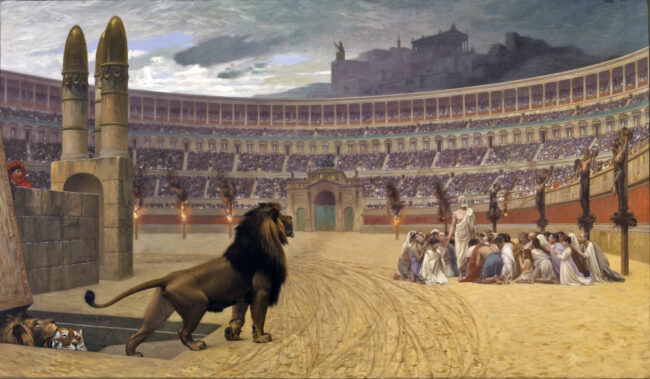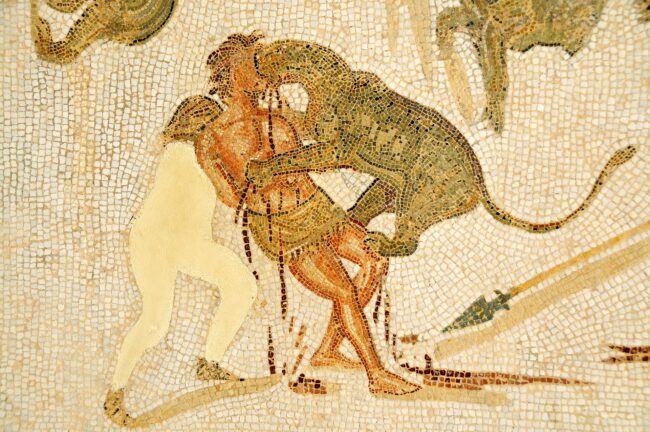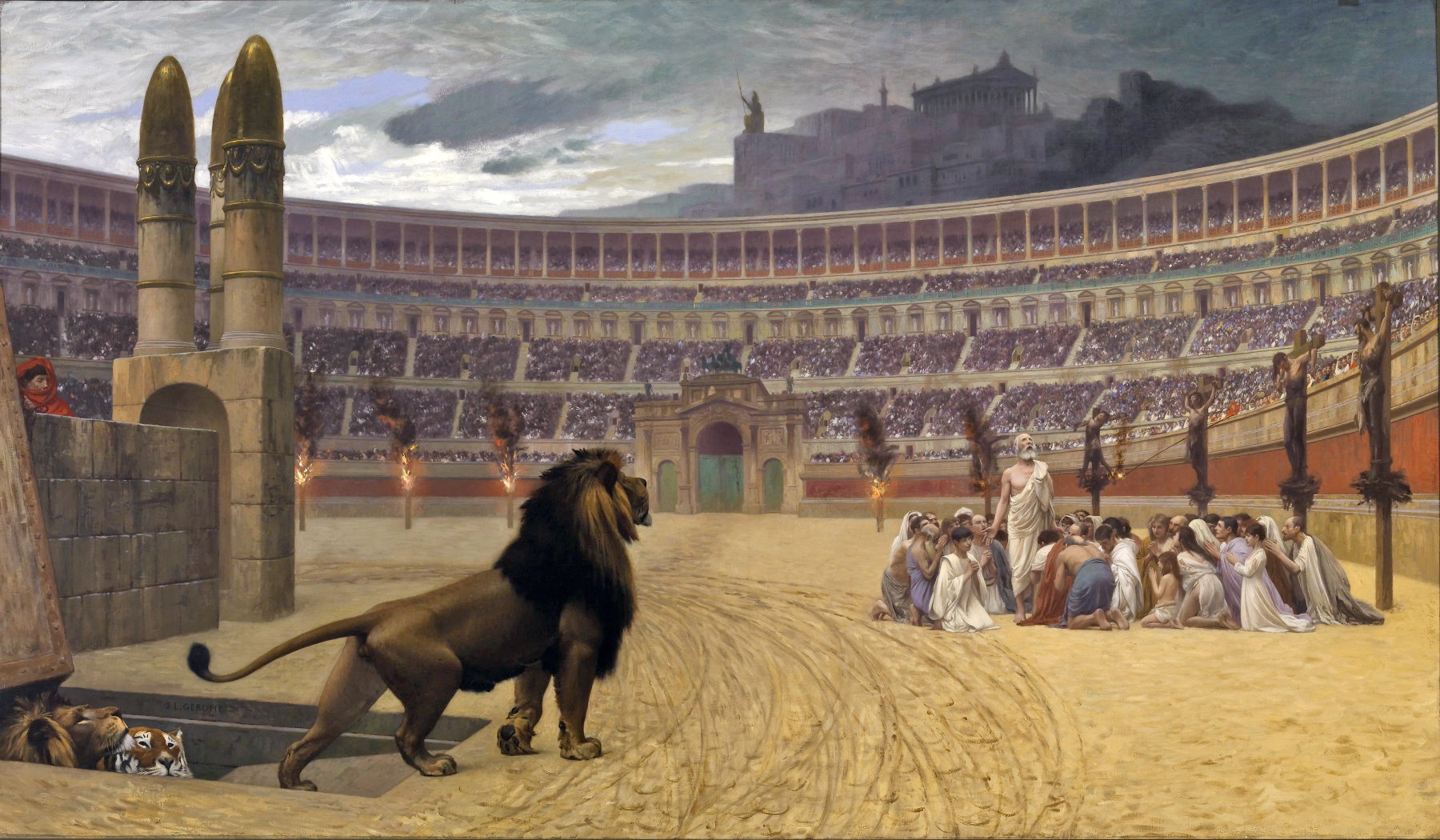
The phrase “Persecution of Christians” brings to mind something akin to the above popular image of innocent loving people being tossed to the lions in the arena for the crime of simply holding a Christian belief.
Be wary of embracing the myth.
Myth?
Well yes.
Damnatio ad bestias
We all carry within our heads a repository of myths that we believe to be true. Some often do have some basis in fact and so we accept it all as true, but often things are a lot more complicated.
What is generally recognised as historically factual are real instances of persecution and oppression. The go-to example that immediately springs to mind would be Nero executing lots of Christians.
Why did he do this, did he just hate their beliefs or was something else going on?
Let’s dig into that a bit.
The background context in AD 64 was the great fire of Rome.
It was a horrific and utterly devastating event as described by Tacitus …
A disaster followed, whether accidental or treacherously contrived by the emperor, is uncertain, as authors have given both accounts, worse, however, and more dreadful than any which have ever happened to this city by the violence of fire.
It had its beginning in that part of the circus which adjoins the Palatine and Caelian hills, where, amid the shops containing inflammable wares, the conflagration both broke out and instantly became so fierce and so rapid from the wind that it seized in its grasp the entire length of the circus. For here there were no houses fenced in by solid masonry, or temples surrounded by walls, or any other obstacle to interpose delay.
The blaze in its fury ran first through the level portions of the city, then rising to the hills, while it again devastated every place below them, it outstripped all preventive measures; so rapid was the mischief and so completely at its mercy the city, with those narrow winding passages and irregular streets, which characterised old Rome.
Added to this were the wailings of terror-stricken women, the feebleness of age, the helpless inexperience of childhood, the crowds who sought to save themselves or others, dragging out the infirm or waiting for them, and by their hurry in the one case, by their delay in the other, aggravating the confusion. Often, while they looked behind them, they were intercepted by flames on their side or in their face. Or if they reached a refuge close at hand, when this too was seized by the fire, they found that, even places, which they had imagined to be remote, were involved in the same calamity. At last, doubting what they should avoid or whither betake themselves, they crowded the streets or flung themselves down in the fields, while some who had lost their all, even their very daily bread, and others out of love for their kinsfolk, whom they had been unable to rescue, perished, though escape was open to them.
Nero got the blame. The rumour was that Nero had ordered the fire so that he could then rebuild bigger and better. He needed to divert that blame on to somebody else … literally anybody would do, and the Christians were an easy target…
As was reported by Tacitus in Annals XV.44 …
But all human efforts, all the lavish gifts of the emperor, and the propitiations of the gods, did not banish the sinister belief that the conflagration was the result of an order. Consequently, to get rid of the report, Nero fastened the guilt and inflicted the most exquisite tortures on a class hated for their abominations, called Christians by the populace…
…but even in Rome, where all things hideous and shameful from every part of the world find their centre and become popular. Accordingly, an arrest was first made of all who pleaded guilty; then, upon their information, an immense multitude was convicted, not so much of the crime of firing the city, as of hatred against mankind. Mockery of every sort was added to their deaths. Covered with the skins of beasts, they were torn by dogs and perished, or were nailed to crosses, or were doomed to the flames and burnt, to serve as a nightly illumination, when daylight had expired.
Nero offered his gardens for the spectacle, and was exhibiting a show in the circus, while he mingled with the people in the dress of a charioteer or stood aloft on a car. Hence, even for criminals who deserved extreme and exemplary punishment, there arose a feeling of compassion; for it was not, as it seemed, for the public good, but to glut one man’s cruelty, that they were being destroyed.
While such events help to craft and nurture a persecution narrative, what we often fail to recognise is that there is something else going on.
In Nero’s specific instance we know exactly what it was. He did not specifically target Christians on a whim. The mob blamed him for the trauma of the great fire that had devastated the city and so he needed to divert their attention elsewhere. Since there was a handy minority, he used them as scapegoats.
It failed. His actions motivated the mob to hate him even more for his excessive cruelty. Understandably so, because Nero was not a good guy who simply suffered due to a few bad media stories, he was a tyrant.
In AD 68, four years after the great fire, Nero was declared a public enemy and condemned to death. This resulted in him fleeing Rome, and on 9 June AD 68 he committed suicide. Even then conspiracies and whispers abounded. Some in distance provinces claimed that he had not died and would soon return. There were even leaders of short-lived failed rebellions who presented themselves as “Nero reborn” to tap into such feelings as they strove to gain popular support.
Persecution is real, it does happen.
As you roll down the ages examining examples of persecution, what you also often discover are examples of members of various Christian denominations persecuting each other and engaging in sectarian violence.
What is usually simmering away is tribalism or raw religious fanaticism.
For the former, take as an example the troubles in Northern Ireland. On the surface we appear to have Protestants and Catholics violently at war with each other. Much of it however stems back to the Elizabethian attempt to colonise and tame the wild Celts by transplanting Scots into Northern Ireland in the late 1500s. The impact of this Plantation of Ulster instead set the stage for the subsequent violence. One side, the native Irish embraced Catholicism and the others who were descendants of those that had been transplanted, Protestantism. Much of the subsequent history concerns the power of “ruling authority” being deployed by the descendants of those that had been transplanted to oppress and discriminate against those deemed to be inferior native Irish. Identification as either Catholic or Protestant was a declaration of tribal allegiance. In other words, a simplistic view might paint a narrative of religiously inspired violence, but bubbling away under the surface is something far more political and tribal.
This all still manifests even today. Every July the Orange Order Protestant loyalists will go out of their way to march down streets in Belfast that are deemed to be Catholic, and of course many of the Catholic residents will be standing out in the street ready to be offended as the marchers go past. This is all so contentious that there exists an official Parades Commission whose real goal is to ensure things operate in a manner that don’t rapidly spin out of control into a violent confrontation.

It’s a common pattern. In many regions of the world where “Christians” face real oppression, what you often discover is that it is really a story about a minority tribal group being targeted by a larger tribal group.
Oppression of minorities by majorities is real and is not a distinct or unique response to variations of belief. Historically at times oppression of Christians has been real, and most often historically it has been some other variation of Christianity that has been doing the persecuting.
However, there is also a rather fascinating twist to all this.
What is deeply odd, and way out of any normal proportion, is the prevailing persecution narrative that exists within Christianity.
Why Is there a Christian Persecution narrative?
Why does this even exist?
It is part of the package deal. It emerged with early Christianity and has been there ever since.
When you believe in a world where there is a God and a Devil, then you live in a divided world. There is no compromise between the two, no dialog, nothing. Just “evil” and “us”. This is a place where “evil” is the label slapped on anything and everything that does not uncritically embrace the variation of belief deemed to be the right one.
Christianity today is the dominant belief in the US, and yet rather bizarrely many fundamentalists within that belief behave as if they are a persecuted minority, the brave few who face the distinct possibility of being throw to the lions for being Christian if the “evil” Democrats ever get elected.
What is of course deeply weird regarding such claims is that the vast majority of Democrats are also Christians.
Even more ironic is the degree of doublethink in play. “Our God has won, is all powerful, and can do anything” is part of the belief. Yet at exactly the same time, many are constantly in fear because Satan is supposedly on the prowl on all sides and his minions will descend to devour the faithful at any moment.
Meanwhile back in our reality, does anybody seek to actually ban the bible? Nope, not at all.
Does anybody seek to ban churches? Nope.
Does anybody wish those who believe to come to any real harm simply because they believe something that is not actually true at all? Nope.
What does happen is that when some proclaim their “truth”, others will point out the logical fallacies within the claims being made or may instead simply dismiss and ignore them. In the eyes of the devout, such responses are often interpreted as persecution. This is daft. Simple and sincere debate is not persecution, nor is ignoring it.
It is important to remember that ideas and beliefs don’t have rights or merit protection, only people have rights. Freedom of Religion brings with it both the freedom to criticise religion, and also the freedom to ignore religion. What Freedom of Religion does not mean is the freedom to impose that religion upon others by force. That’s a step that breaches basic human rights. Pushing back against religion imposing itself by force is not “persecution”, but instead is taking a stance for freedom – Freedom of Religion also brings with it the right to be free from religion.
Step into the bubble of belief and you will quickly come across a narrative that strives to promote the idea that “they” are persecuting us.
If you attempt to nail this down to specific examples of this “persecution”, often you find that there are none that are truly credible. Yet despite this absence, the narrative prevails, so you have to wonder what is going on.
The answer is that it is a necessary part of the belief itself.
Crack open the bible and you will find Jesus counselling his followers like this …
Blessed are you when people hate you, when they exclude you and insult you and reject your name as evil, because of the Son of Man.
Rejoice in that day and leap for joy, because great is your reward in heaven. For that is how their ancestors treated the prophets.
Luke 6:22-23
Permit me to explain.
If you are being insulted, rejected, and persecuted, then this is “biblical evidence” that you are doing Christianity correctly. If however, nobody is insulting or rejecting you, then you are not a “True Christian”.
In other words, experiencing this persecution narrative panders to the idea that you are special and on the right side, hence the belief in being persecuted has been there since the beginning as a very desirable and necessary thing.
Should there be no sign of any persecution, well no problem. Just crank up the rhetoric a few notches, get in peoples faces and tell they that they are going to hell, or that they are wicked and evil because they don’t believe, then those that believe can bask with delight and joy in being told to ‘F**K Off’ as “evidence” of persecution, and can relax because they have earned their “True Christian” badge.
Is everybody who believes like this?
Not at all. Like most things it is complicated. There is a wide diversity of Christian belief. Within each flavour you will find people who hold their beliefs with many different degrees of confidence. For some, belief can be as simple as a place to mark life’s big events – hatching, matching, and dispatching. For others it is just a social club that aligns with their cultural identify and enables them to hang out with other like-minded people. Then there are literalists, the true fanatics who embrace every jot and tittle as non-negotiable “truth”
Generally the persecution narrative resides within the minds of fanatical evangelicals. The concept is also popular amongst right-wing politicians who tap into this narrative to glean support from the evangelical demographic. It works, because those that proclaim such persecution is real, will indeed be granted political support.
The ultimate liar-in-chief, the father of lies, knows how to push such “you all face discrimination, but I will save you” hot buttons, and so they hold their noses when faced with him being a deeply flawed individual by every measure and vote for him as the chosen one who will save them from the persecution and discrimination that does not actually exist at all.
There Really is Christian Persecution in the US
Having said all of the above there is also one other vitally important observation.
Christian Persecution in the US is real, but not in the sense that they are being persecuted, but rather, they are the ones doing the persecuting.
If you dare to doubt that, then consider how these supposedly “loving” people demonise, harass, and make the lives of the LGTBQ community utter hell.
Beyond that, we also have their vigorous push to impose their religious beliefs upon all of us by force.
If you dare to doubt that, then consider how these religious fanatics have successfully denied women healthcare choices.
One Last Story from the Roman Arena
OK, that’s all depressing stuff, so here is an odd little story from the Roman Arena that involves a guy who was “persecuted” for his attempt to redistribute wealth from the Emperor’s family into his own purse.
It comes from a story recorded within the biography of Emperor Gallienus (in the Augustan History).
A merchant was caught selling glass beads to the emperor’s wife instead of gems. He was promptly hauled up in front of the emperor himself because his wife demanded swift justice. Gallienus sentenced the con man to Damnatio ad bestias (Latin for “damnation to beasts”) in the arena.
This was a very cruel death sentence.

On the day, as he awaits his fate in the arena, a capon (basically a chicken) is led into the arena instead of a lion. The emperor’s herald then proclaimed “he has forged, and was treated the same”, and was then let go.
The account does not go into such details, but I suspect this merchant needed to buy new underwear.
The merchant might indeed have felt “persecuted”, but what happened to him was a consequence of his own actions. In a similar manner, many Christians might indeed sincerely believe they are “persecuted”, and so they totally fail to grasp that the pushback they experience is a consequence of their own actions.

What i do not realize is in fact how you are no longer actually much more wellfavored than you might be right now Youre very intelligent You recognize thus considerably in relation to this topic made me in my view believe it from numerous numerous angles Its like men and women are not fascinated until it is one thing to do with Lady gaga Your own stuffs excellent All the time handle it up